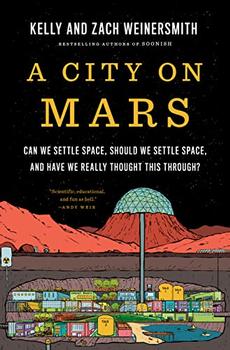Summary | Excerpt | Reviews | Beyond the Book | Readalikes | Genres & Themes | Author Bio

Can We Settle Space, Should We Settle Space, and Have We Really Thought This Through?
by Kelly Weinersmith, Zach Weinersmith
1.
A Preamble on Space Myths
Idyllic views of the future always seem to come with the hidden assumption that human nature will change. That somehow, the flaws of mankind will just melt away amongst the awesomeness of living among the stars. People will abandon mundane flaws like booze and drugs, and also everyone will be super-efficient like some kind of environmentalist's dream. But that's never been the case as we march forward, so I don't see why it would happen in the future.
—Andy Weir, world famous sci-fi author who also writes really insightful commentary in books about booze in space.
Outlandish ideas about space settlement often function as a justification for the whole project, typically promising vast wealth, an improved humanity, or an escape from Earth-awfulness. Because much of this book hinges on the idea that there is no urgent need to settle space, here we'll try to convince you that most of the pro-settlement arguments are wrong. Some of these arguments may be unfamiliar to you, but all of them have at least some powerful advocates in government, military, or business settings.
Bad Arguments for Space Settlement
Argument 1: Space Will Save Humanity from Near-Term Calamity by Providing a New Home
The idea of a multiplanetary humanity as more resilient to extinction is a common one and is plausible over the very long term. However, over the short term, space settlement won't help with any catastrophe you're imagining right this second. Not global warming, not nuclear war, not overpopulation, probably not even a dinosaur-style asteroid event. Why? In short, because space is so terrible that in order to be a better option than Earth, one calamity won't do. An Earth with climate change and nuclear war and, like, zombies and werewolves is still a way better place than Mars. Staying alive on Earth requires fire and a pointy stick. Staying alive in space will require all sorts of high-tech gadgets we can barely manufacture on Earth. We'll elaborate on all of this over the course of the book, but the basic deal is that no off-world settlement anytime remotely soon will be able to survive the loss of Earth. Getting any kind of large settlement going will be hard enough, but economic independence may require millions of people.
We believe there's a decent case for a Plan B reserve of humanity off-world, but there isn't a good case for trying to do it fast. A commonly made argument for urgency is what's sometimes called the "short-window" argument. The idea is that historically, "golden ages" don't last long, so our current age of space travel might come to an end before we get to Mars. We don't know if that's a good analysis of history, but what we can say is that the current age is simply not golden enough to deliver an independent Mars economy. If you want a Mars that can survive the death of Earth, you'd better make sure Earth doesn't die for a very long time.
Weinersmith Verdict: Nah.
Argument 2: Space Settlement Will Save Earth's Environment by Relocating Industry and Population Off-World
There are various flavors of this argument, many of which are popular with the rotating-space-station settlement community, including Jeff Bezos.
One version of this idea is that the solar system contains more than enough mass to create rotating space stations that can accommodate an almost endless number of humans in space. This is literally possible in the sense that there is lots of stuff in space, and the stuff could be refashioned into space bases, but we need a sense of proportion here. The Earth of 2022 puts on about 80 million people per year. If saving our ecology requires us to reduce Earth's human population, then we need to launch and house 220,000 volunteers per day just to tread water.
Excerpted from A City on Mars by Kelly Weinersmith and Zach Weinersmith. Copyright © 2023 by Kelly Weinersmith and Zach Weinersmith. Excerpted by permission of Penguin Press. All rights reserved. No part of this excerpt may be reproduced or reprinted without permission in writing from the publisher.
Your guide toexceptional books
BookBrowse seeks out and recommends the best in contemporary fiction and nonfiction—books that not only engage and entertain but also deepen our understanding of ourselves and the world around us.